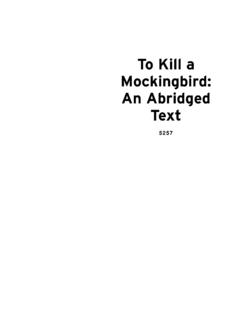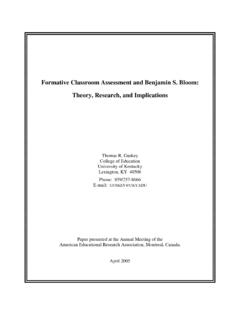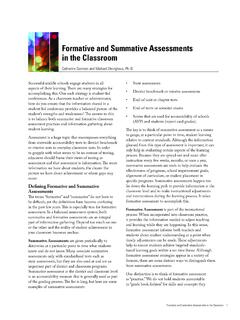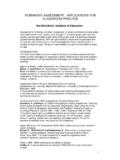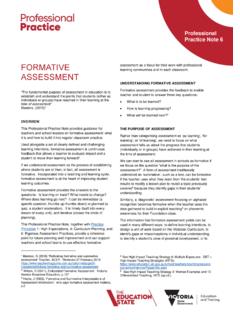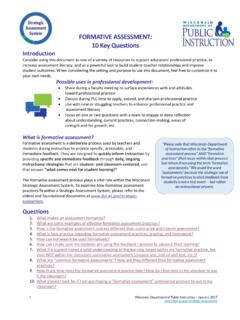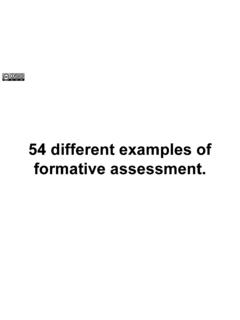Transcription of Formative Assessment Activities: Can They Do the Math?
1 A Resource Guide for Middle School Mathematics Teachers Suzanne Walsh Sierra Nevada College Master of Arts in Teaching Professional Project Spring, 2013 Formative Assessment Activities: Can They Do the Math? This project is lovingly dedicated to Paul, Emily, Daniel, and Timothy. They helped me figure out what I really wanted to be when I grew up and gave me the love and support I needed to become a teacher. I would also like to acknowledge and thank Diane Lancaster for showing up in my driveway one June day. I wouldn t have started this journey or been able to complete it without her! Table of Contents Introduction 5 Why Should Teachers Use Formative Assessments?
2 6 Five Key Principles of Assessment in Action 8 A Note to Teachers 9 Formative Assessment Activities Multiple-Use Assessments 3-2-1 Exit Tickets 11 A-B-C Summary 13 Analogy Writing 14 Classwork Trade 15 Create Your Own Test Questions 16 Fingers on Chest 17 Four Corners 18 Homework Help Board 19 Homework Pathways 20 In-Class Check-Up 21 Learning Logs 22 Monday Quizzes 24 Scale of 0 to 100 25 Student Self-Report Note 26 Think-Pair-Share 27 Three-Minute Pause 29 Which Homework to Do? 30 Formative Assessment Activities: Can They Do the Math?
3 3 Table of Contents (continued) Content-Specific Assessments Before and After Mean, Median, Mode, and Range 32 Circles on the Wall 34 Combining Like Terms: I Have the Answer What s the Question? 36 Transformations of Coordinate Pairs Floor Grid 37 Unit Rate Tables 39 Using Individual Whiteboards 42 Standards Matrix 45 Black-Line Masters 3-2-1 Exit Tickets 49 Student Self-Report Note 51 Think-Pair-Share classroom Checklist 53 Before and After: Mean, Median, Mode, and Range 55 Math Meeting Buddy Sheet 57 Coordinate Pairs Cards 59 Unit Rate Tables 64 References 67 Annotations 69 Formative Assessment Activities: Can They Do the Math?
4 4 Introduction As a Middle School Math teacher, I discovered that I use Formative assessments frequently in my classes in order to inform my teaching and provide feedback to my students. This resource guide will be a helpful tool for teachers, and not just in the mathematics classroom . The primary goal is to provide middle school mathematics teachers with Formative mathematic Assessment activities and ideas on how to use and integrate them into their daily teaching practices. A secondary goal is to provide students with the opportunity to express their knowledge and showcase their critical thinking skills in an alternative Assessment format.
5 Formative Assessment Activities: Can They Do the Math? 5 Why should teachers use Formative Assessment ? Public education in the United States today is largely motivated by standardized testing. Students knowledge is evaluated on a yearly basis using a multiple-choice and open-response testing format, and the efficacy of the teachers is evaluated based on the results of those tests. Teachers in the classroom have freedom with the types of assessments they use; but in my experience, I found that mathematics teachers seem to use multiple-choice tests more often than other types of assessments. The exclusive use of standardized assessments in math can be problematic because multiple-choice assessments do not provide teachers with a well-rounded measure of a student s complete level of skill and ability.
6 Bahr (2004) states that traditional mathematics assessments tend to communicate that mathematics is an endeavor that involves determining a quick answer using a pre-existing, memorized method, thus failing to represent the true complexity of mathematics (p. 33). This suggests that standardized assessments are not meeting the needs of teachers, and therefore alternative forms of Assessment have a place in education in order to meet the needs of teachers for data they can use to inform their lessons. Formative Assessment (FA) is a method of Assessment where students are given immediate feedback and furnished with ideas on how to improve what they are doing.
7 The feedback must be useful to the student and according to Jenkins (2010) be specific, accurate, timely, clear, focused upon the attainable and expressed in a way which will encourage a person to think (p. 566) so they can modify what they are doing, make corrections, and improve their learning. Jenkins Formative Assessment Activities: Can They Do the Math? 6 also stated that the effectiveness of [ Formative Assessment ] is reduced if students are not appropriately informed of what they are expected to demonstrate a knowledge of (p. 567). In their research, Volante & Beckett (2011) stated that Formative strategies such as questioning techniques, feedback without grades, self- Assessment , peer Assessment , and Formative use of summative assessments can double the speed of student learning (p.)
8 240). The use of FA in the classroom has also been shown to reduce the achievement gap because FA strategies benefit low achievers the most. Formative mathematics assessments can provide teachers with new information regarding the problem-solving skills and abilities of their students, and in turn inform teachers instruction (Bryant, 1996). Formative Assessment methods also give students the opportunity to showcase their skills and abilities in less traditional ways. This project will be based on the five key principles of Assessment in action as outlined by Clark (2008) with the activities adapted to address all of these principles, in order to encourage dialogue and feedback between student and teacher.
9 Formative Assessment Activities: Can They Do the Math? 7 Five Key Principles of Assessment in Action* must be able to understand clearly what they are trying to learn, and what is expected of them. must be given feedback about the quality of their work and what they can do to make it better. must be given advice about how to go about making improvements. must be fully involved in deciding what needs to be done next. must be aware of who can give them help if they need it. *Clark, I. (2008). Assessment is for learning: Formative Assessment and positive learning interactions.
10 Florida Journal of Educational Administration and Policy, 2(1), 1-16. Formative Assessment Activities: Can They Do the Math? 8 A Note to Teachers As any teacher does, a math teacher experiences all levels of student abilities and understanding of the content being taught in any given lesson in the classroom . But math classes can move quickly from concept to concept, sometimes with little or no Assessment until unit tests or chapter tests. This can leave a math teacher wondering if her students are learning the concepts being taught, and leave students wondering if they understand those concepts as well.
